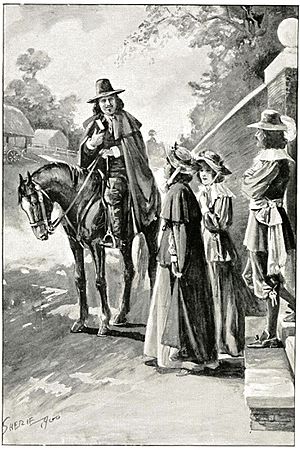Agnes Beaumont facts for kids
Quick facts for kids
Agnes Beaumont
|
|
|---|---|

much later illustration of her and John Bunyan
|
|
| Born | Baptised 1652 Edworth, Bedfordshire |
| Died | 1720 |
| Nationality | British |
Agnes Beaumont (born 1652 – died 1720) was an English writer. She wrote about her life and religious experiences. Agnes became well-known because she was falsely accused of serious wrongdoing with a famous preacher, John Bunyan. She also faced untrue accusations about her father's death. Agnes wrote her autobiography to share her side of the story and prove her innocence.
Contents
Agnes Beaumont's Early Life
Agnes Beaumont was born in a village called Edworth in Bedfordshire, England. She was baptised in 1652. Her parents were John and Mary Beaumont, who lived in Pirton.
Joining a New Church
Agnes's family did not follow the main church of England at the time, which was Anglicanism. So, it was not a surprise when Agnes decided to join a different church. This church was in Gamlingay and was led by a well-known preacher named John Bunyan.
However, Agnes's father, who was now a widower, did not approve of her attending these church meetings. He told her she was not allowed to go. One day, John Bunyan gave Agnes a ride on his horse. When she returned, her father was very angry.
A Difficult Choice
Agnes's father then made her leave their family home. He said she could not come back unless she promised to stop going to the church meetings. It was winter, and Agnes spent two days outside in the cold. Finally, she agreed to her father's demand so she could come back inside.
False Accusations
The very next night after Agnes returned home, her father sadly passed away. While a heart attack might have been the cause, a neighbor, Mr. Feery, made a very serious and untrue accusation. He claimed that Agnes was responsible for her father's death. In her autobiography, Agnes suggested that Mr. Feery, a lawyer, had wanted to marry her before. But after she started attending church, he "turned against me."
This was a very serious accusation, but a coroner and his jury investigated. They found that Agnes was not involved in her father's death. Even though she was found innocent, false rumors began to spread. People wrongly said that she and John Bunyan were involved in a secret relationship. The next year, Mr. Feery even spread another false rumor that Agnes had set a house on fire. Agnes wrote her detailed account of these events around 1674.
Later Life and Marriage
In 1702, Agnes Beaumont married Thomas Warren. He lived in Cheshunt. Sadly, Thomas passed away in 1707. The following year, in 1708, Agnes married again. Her second husband was Samuel Storey, who was a successful fishmonger. Agnes still owned half of her first husband's land in Cheshunt.
Agnes Beaumont passed away on 28 November 1720. She was buried at the Tilehouse Street Baptist chapel in Hitchin. This was her church, and she had even helped to pay for its building. Samuel Storey, her second husband, lived longer than she did.
Agnes Beaumont's Legacy
Agnes Beaumont's personal story was first printed in a book in 1760. The book was called An Abstract of the Gracious Dealings of God with Several Eminent Christians in their Conversions and Sufferings. It included extra writings by Reverend Samuel James. This book became very popular. Over the next eighty years, it was published ten times!
Remembering Her Contribution
In 1812, a special plaque was placed on the Tile House Baptist church. This plaque was put there to remember Agnes Beaumont. It recorded that she was a member of the church and that she was guided by John Bunyan.
By 1901, Agnes Beaumont was even featured in a book about "girl heroines." This shows how her story continued to inspire people.
Her Original Writings
The original handwritten copy of Agnes Beaumont's autobiography is nineteen pages long. It is titled "The Narrative of the Persecution of Agnes Beaumont." The British Museum bought this important document in the 1870s. Today, it is carefully kept safe in the British Library.
 | Valerie Thomas |
 | Frederick McKinley Jones |
 | George Edward Alcorn Jr. |
 | Thomas Mensah |

